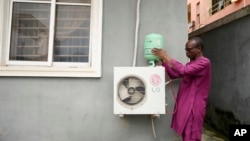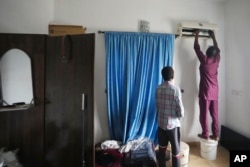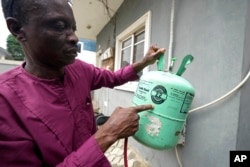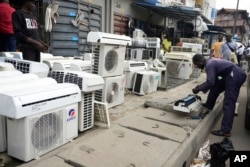Rising demand for cooling systems in Nigeria and other African nations might be making existing pollution problems worse.
Cooling systems use gases called refrigerants. Such gases can affect the atmosphere if they escape. Some of these pollutants have been found to be more harmful than other kinds of greenhouse gases.
The Nigerian government has approved restrictions on the release of refrigerant gases into the environment. But enforcement efforts for the laws have been difficult.
Abiodun Ajeigbe leads an air conditioning business for Samsung, West Africa. He told The Associated Press (AP), “Those laws, those rules, nobody enforces them.”
Ajeigbe said one of the biggest problems is a lack of effective education and training about the possible harms of refrigerants. This means many cooling system installers might not follow legal requirements when removing old systems or putting new ones in.
Some trained workers do follow environmental rules governing the use of cooling refrigerants. But these kinds of installations cost more.
Industry experts and public records suggest the most common air conditioning systems in Africa use a kind of gas known by the trade name R-22. This refrigerant is said to be less harmful to the environment than older cooling chemicals known as chlorofluorocarbons (CFCs). CFC’s have largely been removed from most modern cooling systems. That change was put in motion by the 1987 Montreal Protocol environmental treaty.
A document from the U.S. Environmental Protection Agency (EPA) says R-22 is considered many times more damaging to the world’s climate than carbon dioxide. For example, about one-half kilogram of R-22 is said to equal one ton of carbon dioxide, the most common greenhouse gas.
However, while carbon dioxide can stay in the atmosphere for more than 200 years, R-22 stays for about 12 years. R-22 cooling equipment is not as energy efficient as some other systems. And most of the electricity used to power R-22 coolers in Africa requires carbon-based fuels.
Nigeria is planning to ban R-22 refrigerants by January 1, 2030. But without enough enforcement, that target is not likely to be met, Samsung’s Ajeigbe told the AP.
Some cooling systems use a group of refrigerants called hydrofluorocarbons (HFCs). These do not harm the ozone layer and are more energy efficient. But HFCs are said to be strong greenhouse gases and account for an estimated 2 percent of all human-caused warming in the atmosphere.
One of the most harmful HFCs, called R-410A, is used in the second most common kind of air conditioners in Africa, the AP reported. Sellers and installers of cooling equipment in Nigeria told the news agency that although HFC systems are less damaging to the environment, they are more costly to operate.
The same issues are affecting countries beyond Nigeria. In Ghana, the cooling industry also struggles to get companies and workers to obey current environmental rules.
Environmental officials in Ghana told the AP that “poor servicing practices” for cooling systems are common across the country. This is largely the result of the public choosing lower-trained installers who might not follow recommended standards.
In Kenya, demand for cooling systems is also growing as the population grows and electricity becomes more widely available. Cooling systems using R-22 are still common across the country. But the nation’s Environmental Management Authority told the AP there have not been any new imports of the systems since 2021.
Workers dealing with cooling systems and refrigerants are required to get a license. But several installation workers told the AP that since such requirements are hard to enforce, environmentally unsafe methods are carried out.
I’m Bryan Lynn.
The Associated Press reported this story. Bryan Lynn adapted the report for VOA Learning English.
__________________________________________
Words in This Story
greenhouse gases - n. gases in the Earth’s atmosphere that can trap heat
install – v. put a piece of equipment somewhere and make it ready to use
efficient – adj. working well and not wasting time or energy
ozone layer – n. the layer of ozone high above the Earth’s surface that prevents much of the ultraviolet radiation from the sun from reaching Earth’s surface
standard –n. an accepted way of doing something that is agreed upon by industry or government officials
license –n. official permission to do an activity, such as driving a car, that usually involves a document









Forum